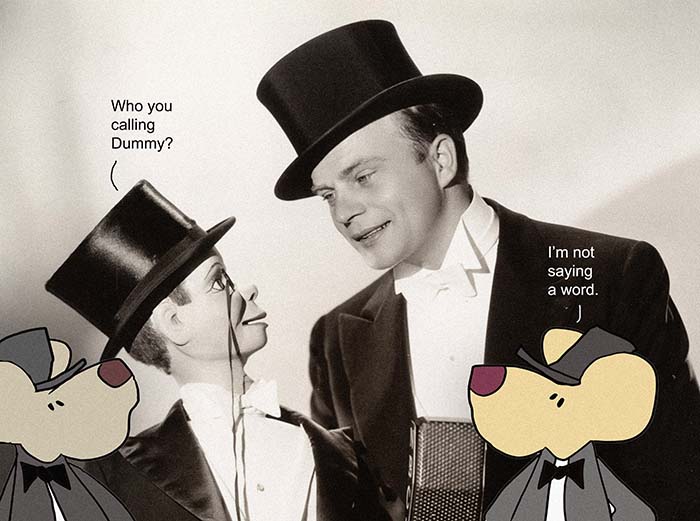The things where there are no things. We see them as remarkable, at first glimpse, or perhaps sound. Like the voices. Not the ones in my head, but those of ventriloquists.
Who better to regard in this manner than Edgar Bergen. Today is his birthday, February 18, 1903, born in Chicago. He was one of the greatest ventriloquists of all time and best known with his dummy, Charlie McCarthy. The two of them were peas in a pod.
He was one of five children — his parents were Swedish immigrants (Nilla Svensdotter née Osberg, and Johan Henriksson Berggren). They moved around a bit early on. Bergen spent his first four years on a farm near Decatur, Michigan. Then, they picked up and went back to Sweden for some reason, and while he was there, he learned the Swedish language.
They crossed the ocean again, moving back to Chicago when Bergen was eleven. It was then that he happened across a pamphlet called “The Wizard’s Manual” and from that little paper, he taught himself ventriloquism.
When I was a kid, I tried to teach myself ventriloquism. I probably had watched thirty minutes of Lamb Chops. I asked my Mom to make me a sock puppet, and it turned out amazingly Lamb-Choppy. As hard as I tried, I could not stop my mouth from moving.
I kept trying the phrase, “My name is Polly, and I’m from Venus.” I was doomed to fail. The letters most ventriloquists have problems with? They are “B,” “F,” “M,” “P” and “V.” Okay, so I really don’t remember what I tried to say, but I bet it was filled with “B,” “F,” “M,” “P” and “V.” And as such, my career as a ventriloquist ended at age seven.
The origins of ventriloquism are interesting. It started out as a religious practice. The name comes from the Latin for ‘to speak from the stomach: venter (belly) and loqui (speak).
Those whacky Greeks of yore. They thought that when someone’s stomach made a grumbly noise, it was the voices of the dead, who somehow started hanging out in the stomach of the ventriloquist. Then, amazingly, the ventriloquist would interpret the sounds. Speaking directly to the dead, right through the old belly button. They foretell the future after a greasy plate of Gyros.
But, ventriloquism changed. It shifted from a manifestation of spiritual forces to a form of entertainment. This happened during the 1700s. Back then, they had “traveling funfairs” and open markets, and that is where people started to perform their dummy skills.
There was a difference between the ventriloquism of yesteryear and today.
Back then, most performers threw their voice, so it sounded like it was far away. Today, it always comes with a puppet.
Back to Edgar Bergen. One of the most famous of all ventriloquists, Harry Lester, was completely impressed with young Bergen’s skills. Lester gave the teenager daily lessons for three months — all about the fundamentals of ventriloquism.
He was only sixteen years old in the fall of 1919. That is when Edgar paid a Chicago woodcarver named Theodore Mack $36. He asked him to create a likeness kid he knew — an Irish newspaper boy with red hair and a rascal face. That wooden head became a dummy named Charlie McCarthy. He was Bergen’s lifelong sidekick. Edgar created the body himself. He used a nine-inch length of broomstick for the backbone. Then he connected rubber bands and cords to control the lower jaw and the mouth.
Oh, the dummy. A dummy can be a lot of things. It might be a stupid person. Or. In cards, that person who just sits there, as their partner plays on. It can be something used as a substitute for the real thing. Or in this case, a ventriloquist’s doll.
Here is the key, as it relates to our lives. That dummy has a voice, sometimes controlled by someone else. Which should remind us that there are a lot of dummies out there with voices. Our mission is not to be one of them.
==========
“The voice of beauty speaks softly; it creeps only into the most fully awakened souls”
― Friedrich Nietzsche
=========
“Remember not only to say the right thing in the right place, but far more difficult still, to leave unsaid the wrong thing at the tempting moment.”
― Benjamin Franklin
=========
“Listen with curiosity. Speak with honesty. Act with integrity.”
― Roy T. Bennett, The Light in the Heart
=========
Hey Dummy. Don’t speak up.
